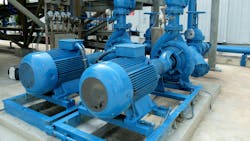Processing Equipment: Are Guarantees Worthwhile?
“Can you guarantee that will work?” For a company employee, a flubbed fix might lead to a poor performance review or even a career dead-end. An external supplier or service provider might face the demand for a refund or even for the cost of damages incurred.
As a consultant and troubleshooter, often I get asked this question. After all, the plant isn’t working today, so obviously something the customer got wasn’t right. It wants the problem fixed. So, yes, it wants a guarantee the unit will work.
Responding, “Of course, we guarantee it,” poses serious perils because the word “guarantee” raises legal issues of liability. Any use demands careful definition of exactly what is being guaranteed, how it is being determined, and what the consequences of failure are.
What the customer really is asking is two-fold. First, are you really sure? Second, because the customer knows it’s taking a risk, have you, the supplier, properly evaluated its risk? In other words, the customer would like you to assume some of the risk to show that you’re really sure.
What the supplier or service provider is hearing is the dreaded word “liability.” Few suppliers of any type could cover the liability that might arise from a failure in a process plant. The word “guarantee” without legalese to limit liability just isn’t realistic. Reputable suppliers usually will point out that, no matter what, they put their good name on the line with every recommendation. However, that won’t suffice for every customer.
Some specific equipment types have industry procedures and methods for determining performance, e.g., Hydraulic Institute or American Petroleum Institute standards for pumps. Other equipment may have vendor-specific requirements but is tested often enough that standardized procedures are available. An example of this is burner performance testing for fired heaters; all major vendors have specific test methods to demonstrate burners will meet emissions requirements under particular conditions. Of course, your own company may have methods for this testing as well. Then, the seller and buyer must negotiate what the guaranteed performance covers.
More challenging are types of equipment like heat exchangers where testing tends to be service specific. Some services (e.g., steam/water) may be straightforward but others may involve elaborate testing procedures.
Other equipment rarely is tested versus specific performance criteria due to the difficulty and expense involved. Examples include distillation internals. Such testing often demands case-specific procedures. If the guarantee covers both capacity and efficiency, it may require extensive analytic and instrumentation support as well as definition in advance of data methods. The guarantee becomes a very complex document in most tests like these.
The ultimate guarantee is for a process as a whole. Most processes involve multiple steps to get from feed to product. Guarantees may involve emissions, efficiency, capacity, yield, catalyst life and performance, purities, reliability and many other operational criteria. Multiple factors including feed types, compositions, products, environmental conditions, laboratory techniques, calculation methods and other factors must be defined. Also, does the guarantee cover only the overall process or do some intermediate points within the process have specific requirements as well?
In addition, it’s important to define what will indicate failure to meet the guarantee. This may include the number of attempts that can be made, who is responsible and to what extent for equipment and process modifications, when the performance test must be performed, and limitations on the type and cost of changes.
All of the defined factors also are subject to legal requirements in the specific jurisdictions involved. For example, no supplier or service provider willingly accepts consequential damage guarantees. However, some countries mandate that the presence of a guarantee includes coverage of some types of consequential damages.
This sounds complex because it is complex. Guarantees increase the amount of time required to negotiate contracts. Someone must pay for the work involved in performance testing. Equipment and services with formal guarantees cost more. So, a provider of equipment or services should make sure it understands the legal implications of providing more than the “industry standard” for a guarantee. Likewise, a customer should carefully decide if demanding a formal guarantee really is worth the extra effort and cost versus simply relying on the reputational risk a supplier carries.
About the Author
Andrew Sloley, Plant InSites columnist
Contributing Editor
ANDREW SLOLEY is a Chemical Processing Contributing Editor.

